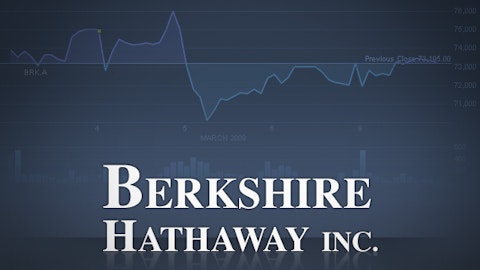Although we don’t believe in timing the market or panicking over daily movements, we do like to keep an eye on market changes — just in case they’re material to our investing thesis.
U.S. stocks went back to their losing ways on Friday, with the S&P 500 (INDEXSP:.INX) down 0.4%, while the narrower, price-weighted Dow Jones Industrial Average (Dow Jones Indices:.DJI) lost 0.3%. Four out of five days were losers this week, as stocks broke a six-week streak of winning weeks with their worst performance since June.

With no other obvious factors to explain the week’s stock market performance, the narrative that is most commonly cited is that of “taper fears” relating to a potential reduction in the pace of the Fed’s monthly bond purchases (“quantitative easing”). That the simple possibility of this tapering should weigh so heavily on the market is rather odd, from a long-term fundamental investor’s perspective.
Canada’s Warren Buffett — an investor worth listening to
Speaking of long-term fundamental investors — it’s so hard to spot that species in the financial media today, that when a member of the species does make an appearance, it’s well worth paying attention.
There was one spotted today, as Bruce Flatt, the CEO of Canadian investment firm Brookfield Asset Management Inc. (USA) (NYSE:BAM) appeared on CNBC to discuss his outlook and approach. A dedicated and highly successful value investor, Flatt is sometimes referred to as a Canadian Warren Buffett. Here are some of the highlights of the discussion:
Bullish on America
We’re very bullish on America, and the economy is doing extremely well. We put a lot of money through 2009, 2010 and 2011. Housing is coming back. Retail is coming back. [The] shale gas revolution is doing a lot of things. Manufacturing is coming back. So we’re very bullish on everything in America — you can see it in our results today… we’re still putting money into America… we have $100 billion in assets inside the United States.
Achieving good returns: Keep it simple
We’re investing across the real asset sector; these are operating businesses that everyday just produce cash. We continue to do that and America is a good place to do that today.
Interest rates are extremely low, as you know, at 2%-3% and we can earn [our investors] 12%-15% consistently over time. If you buy right, you don’t’ make too many mistakes; therefore that’s an extremely attractive return for an institutional client.
You don’t have to pick the bottom of the market. You just need to earn a decent return over a long period of time.
Why real assets (i.e., housing, infrastructure, stocks) will beat bonds
Most important point here: Real assets are not fixed income assets. Often [investors] are confused. The cash flows [from real assets] will go up with inflation, they’ll go up with business conditions and they’ll go up as America gets better, and every other country gets better.
Three areas of opportunity today
We’re value investors and we take our money where we can… In Europe, there’s a great opportunity. It’s slow growth place, but if you buy right, there are tremendous value opportunities. We’re really looking at three areas in the world today: Europe, emerging markets, as money comes out of those markets and there’s less capital there, and things around commodities – a lot of commodity companies who have infrastructure assets that they need off their balance sheets or they need partners.
The article Why Canada’s Warren Buffett Is Bullish on America originally appeared on Fool.com and is written by Alex Dumortier, CFA.
Fool contributor Alex Dumortier, CFA has no position in any stocks mentioned; you can follow him on LinkedIn. The Motley Fool has no position in any of the stocks mentioned.
Copyright © 1995 – 2013 The Motley Fool, LLC. All rights reserved. The Motley Fool has a disclosure policy.





